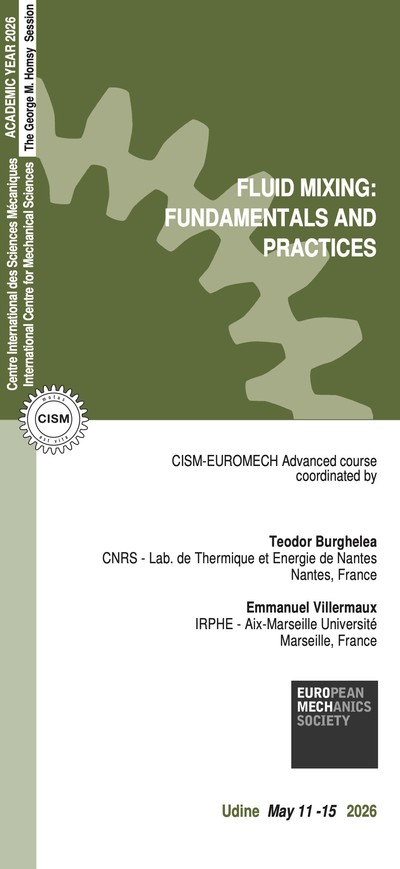Turbulence is sometimes described as the last unsolved problem of classical physics. While significant advances have been made towards solving this problem, the available results are largely confined to asymptotic scaling laws for non-dimensional descriptors of homogeneous, isotropic turbulence. In contrast, turbulent flows observed in nature and technology tend to display coherent structures, rendering the hypotheses of homogeneity and isotropy invalid. Coherence in unsteady flows has been studied in four main contexts:
- Eulerian coherent vortices (ECV): spatial patterns in the instantaneous velocity field.
- Lagrangian coherent structures (LCS): persistent spatial patterns in tracer distributions.
- Objective Eulerian coherent structures (OECS): the instantaneous limits of LCSs.
- Exact Coherent States (ECS): persistent temporal patterns in the velocity field.
ECV are well studied in fluid dynamics but have no universally accepted definition or detection algorithm. This is largely due to the inherent dependence of this concept on the observers and to the lack of an experimentally verifiable ground truth. In contrast, LCSs, OECSs and ECS have observer-independent features, and hence definitions and algorithms aimed at their identification are experimentally verifiable. Going beyond a popular-level understanding of these three coherence notions, however, requires a solid command of higher mathematical and computational concepts.
The objective of this course is to provide an opportunity for junior researches to obtain a first-hand introduction to contemporary coherent structure detection techniques and computational algorithms. The lectures will be delivered by recognized experts who have participated directly in the development and applications of these methods. The list of speakers is intentionally broad, ranging from mathematicians through engineers to physical oceanographers. The scope of the course is similarly broad, covering necessary fundamentals from dynamical systems, continuum mechanics, fluid mechanics, probability, operator theory, stability theory for the Navier-Stokes equations, as well as related computational algorithms. Of the specific coherence concepts, the lectures will cover Lagrangian and Eulerian coherent structures, coherent diffusion barriers, coherent sets and exact coherent states in turbulence.
This course is addressed to doctoral students, postdocs, and young scientists wishing to learn the basics of the field. Given the diversity in the expertise of the speakers and the broad range of the applications, the participants are expected to gain substantial insight into this exciting and quickly involving area of research. They will also have access to Matlab and high-performance Fortran codes implementing the main techniques. Finally, participants will have a chance to briefly introduce a poster summarizing their own related research.
Haller, G., Lagrangian Coherent Structures. Annual Rev. Fluid. Mech, 47 (2015) 137-162.
Hadjighasem, A., Farazmand, M., Blazevski, D., Froyland, G. and Haller, G., A Critical Comparison of Lagrangian Methods for Coherent Structure Detection. Chaos, 27:053104, 2017.
Haller, G., Climate, Black Holes and Vorticity: How on Earth are they related? SIAM News, 49/5 (2016) 1-2.
Beron-Vera, F. J. & LaCasce, J. H. Statistics of Simulated and Observed Pair Separations in the Gulf of Mexico. J. Phys. Oceanogr. 46, 2183-2199 (2016).
Beron-Vera, F. J.; M. J. Olascoaga; G. Haller; M. Farazmand; J. Triñanes & Wang, Y. Dissipative inertial transport patterns near coherent Lagrangian eddies in the ocean Chaos 25, 08741 (2015).
Duran, R.; F. J. Beron-Vera & Olascoaga, M. J. Extracting quasi-steady Lagrangian transport patterns from the ocean circulation: An application to the Gulf of Mexico. Scientific Reports 8, 5218 (2018).
Froyland, G. and Padberg-Gehle, K., Almost-invariant and finite-time coherent sets: directionality, duration, and diffusion. In Wael Bahsoun, Chris Bose, Gary Froyland, editors, Ergodic Theory, Open Dynamics, and Coherent Structures. Proceedings in Mathematics and Statistics, volume 70, pages 171-216, Springer, 2014.
Froyland, G., and Junge, O., On fast computation of finite-time coherent sets using radial basis functions. Chaos, 25 (2015) 087409.
G. Kawahara, M. Uhlmann, and L. van Veen. The significance of simple invariant solutions in turbulent flows, Ann. Rev. Fluid Mech. 44 (2012) 203—225.
M. Avila, F. Mellivobsky, N. Roland & B. Hof, Streamwise-localized solutions at the onset of turbulence in pipe flow, Phys. Rev. Lett. 110 (2013) 224502.
R. R. Kerswell, Nonlinear Nonmodal Stability Theory, Ann. Rev. Fluid Mech. 50 (2018) 319— 345.
6 lectures on: Exact coherent states (ECS), hydrodynamic stability theory with the example of Taylor— Couette flow, relative equilibria and relative periodic orbits; direct numerical simulation of the Navier—Stokes equations, direct computation of ECS with Newton—Krylov methods, high-performance codes (including hands-on work); connection between ECS and LCS, examples.
6 lectures on: Energy dissipation routes in the ocean, local and nonlocal mixing and its consequences for deterministic prediction, occurrence of Lagrangian coherence, inertial coherent structures and their detection; transport by coherent vortices in the ocean; extraction of persistent transport patterns from large oceanic data sets; finite-size effects; applications (trash in the ocean, oil spill evolution prediction).
6 lectures on: Eulerian and Lagrangian views on coherence, basic considerations (finite time-horizon, frame-indifference), classic coherence criteria in fluids and their shortcomings, LCS detection from finite-time Lyapunov exponents, objective variational methods for LCS and OECS (advective, diffusive and stochastic techniques), rotational coherence, relation to transport barriers.
6 lectures on: Probabilistic theory of advective coherent sets in unsteady flows, transfer operators/generators and their discretization, macroscopic dynamics via spectral decompositions, almost invariant and coherent sets, spectral methods for coherent set detection, dynamic isoperimetry and geometric heat flow, numerical methods and examples.
6 lectures on: Exact coherent states (ECS) in wall-bounded shear flows, self-sustaining process of turbulence, techniques to compute ECS, branch continuation, stability, bifurcations; role of ECS in turbulent flow, how to find them and assess them; linear and nonlinear optimization, variational calculus, transient growth, connection to ECS.
The registration fee is 600.00 Euro + VAT*, where applicable (bank charges are not included). The registration fee includes a complimentary bag, four fixed menu buffet lunches (on Friday upon request), hot beverages, downloadable lecture notes and wi-fi internet access.
Applicants must apply at least one month before the beginning of the course. Application forms should be sent on-line through the following web site: http://www.cism.it. A message of confirmation will be sent to accepted participants. Applicants requiring assistance with the registration should contact the secretariat at the following email address cism@cism.it.
Applicants may cancel their course registration and receive a full refund by notifying CISM Secretariat in writing (by email to cism@cism.it) no later than two weeks prior to the start of the course.
Cancellation requests received during the two weeks prior to the start of the course will be charged a 50.00 Euro handling fee. Incorrect payments are also subject to a 50.00 Euro handling fee.
A limited number of participants from universities and research centres who are not supported by their own institutions can be offered lodging and/or board, if available, in a reasonably priced hotel or student guest house.
Requests should be sent to CISM Secretariat by April 3, 2019 along with the applicant's curriculum and a letter of recommendation by the head of the department or a supervisor confirming that the institute cannot provide funding. Preference will be given to applicants from countries that sponsor CISM.
Information about travel and accommodation is available on the web site www.cism.it, or can be mailed upon request.
* Italian VAT is 22%.






